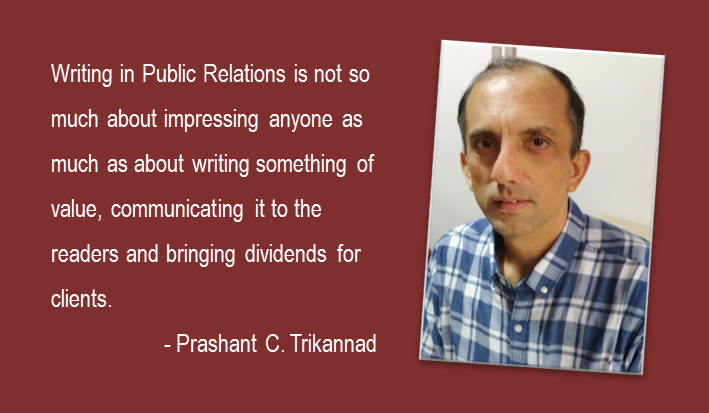Does Public Relations need great writing? As someone who has spent considerable years writing for print media and public relations, my answer is — not necessarily. While great writing is always an asset, it isn’t nearly as important as good and effective writing. By that I mean the writing ought to have clarity, a sense of purpose, brevity, an easy and engaging style, accuracy of facts and figures, empathy depending on what you’re writing and, above all, it must tell a story in a way journalists don’t have to think twice before giving it coverage.
PR writing is not so much about impressing anyone as it is about writing something of value, communicating it to the readers and bringing dividends for clients. For example, if you’re writing an article on, say, 5 reasons why you need to invest in life insurance, then tell the reader just that — why. You don’t require sparkling prose. You’re not in it for the PR equivalent of a Pulitzer. Is there even one?
Of course, you can find clever ways to make a seemingly mundane piece on insurance as interesting as you can. For instance, you can incorporate examples – an insurance calculator – of what it means to buy life insurance at, say, age 25 and 45, and how either scenarios will affect the reader financially. The basic fact – the younger you are, lower the premium and higher the cover – should be conveyed in a clear and convincing manner, so that the reader is eager to know more.
My experience as a content writer for public relations has taught me two things. One, PR writing must be lucid, focused and insightful. And two, never beat around the bush. Get to the point as quickly as you can. Neither the journalist nor the reader has the time or patience to figure out what you’re getting at. You can, however, write as you choose in your personal diary or on your blog.
Not long ago, I read several articles online on personal finance, particularly with respect to investing at my age. I found only two or three articles really useful, because they were focused and told me what I wanted to know – where I could park money at my age and how it would benefit me after I retire. Most of the other articles were pedantic and explained what personal finance was and why financial planning was important to fulfil our life goals. Nothing I didn’t know already.
In the realm of client servicing, we are probably doing a disservice to clients by putting out stories and articles that deviate from the theme and lack proper focus.
There is another side to effective PR writing. It should as far as possible be aligned with the business goals of your clients and their brand objectives. Every piece that you write, be it a press release, a thought-leadership article or a blog post, must fulfil three criteria – why you are writing (purpose), who you write for (target audience) and how you write (style). The ROI for clients, which is excellent media coverage, will largely depend on how well you incorporate these key aspects into your writing.
Finally, the aim of any good PR writing is to stick to the topic or theme, provide original insights and write as well as you can. Do this and you will have the reader’s attention.
The views expressed here belong to the author and do not necessarily reflect those of his organisation or the publisher.



Excellent writing Prashant. You always had a knack of putting ideas into words.